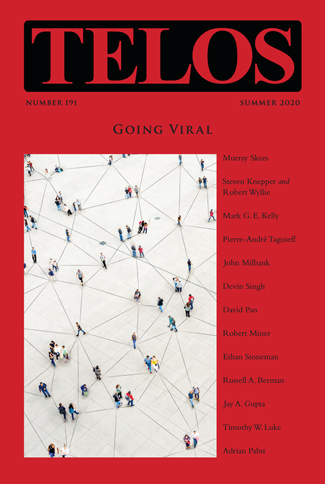In today’s episode of the Telos Press Podcast, Camelia Raghinaru talks with Robert Miner about his article “Human Joy and the Subversion of Work/Play Distinctions: A Note on Adorno’s Minima Moralia 2.84,” from Telos 191 (Summer 2020). An excerpt of the article appears here. If your university has an online subscription to Telos, you can read the full article at the Telos Online website. For non-subscribers, learn how your university can begin a subscription to Telos at our library recommendation page. Purchase a print copy of Telos 191 in our online store.
|
“The human receives a particular historical consciousness from his ‘space,’ which is subjected to great historical transformations. The variegated forms of life correspond to equally differentiated spaces. Even within the same time period, the environment of individual humans for the practice of daily life is already defined differently by their different life occupations. An urbanite thinks the world otherwise than does a peasant farmer, a whale-fish hunter has another living space than an opera singer, and to a pilot the world and life appear otherwise not only in other lights but also in other quantities, depths, and horizons.” —Carl Schmitt, Land and Sea: A World-Historical Meditation “The human receives a particular historical consciousness from his ‘space,’ which is subjected to great historical transformations. The variegated forms of life correspond to equally differentiated spaces. Even within the same time period, the environment of individual humans for the practice of daily life is already defined differently by their different life occupations. An urbanite thinks the world otherwise than does a peasant farmer, a whale-fish hunter has another living space than an opera singer, and to a pilot the world and life appear otherwise not only in other lights but also in other quantities, depths, and horizons.” |
||||
|
Telos Press Publishing · PO Box 811 · Candor, NY 13743 · Phone: 212-228-6479 Privacy Policy · Data Protection Copyright © 2024 Telos Press Publishing · All Rights Reserved |
||||








